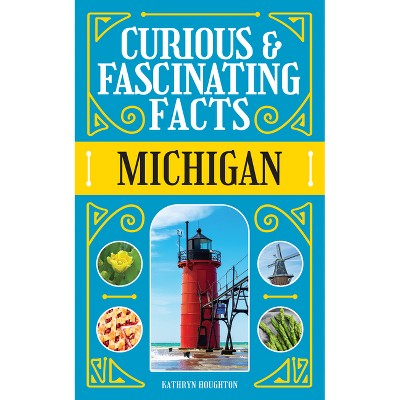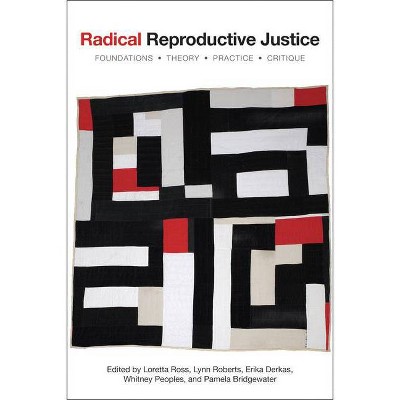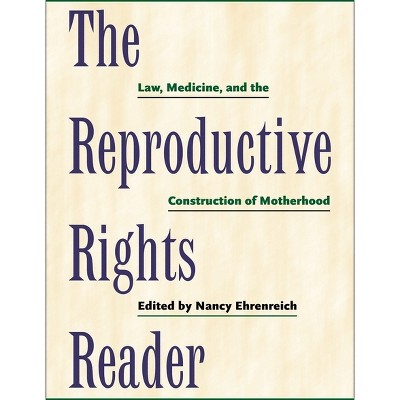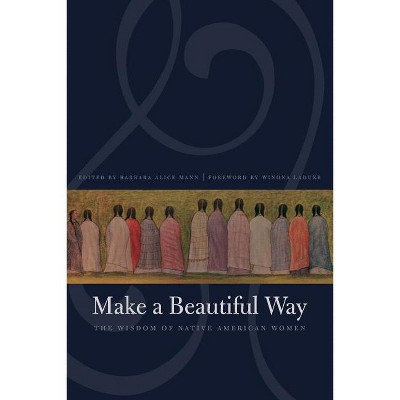Sponsored

Reproductive Justice - by Barbara Gurr (Paperback)
Out of Stock
Sponsored
About this item
Highlights
- In Reproductive Justice, sociologist Barbara Gurr provides the first analysis of Native American women's reproductive healthcare and offers a sustained consideration of the movement for reproductive justice in the United States.The book examines the reproductive healthcare experiences on Pine Ridge Reservation, home of the Oglala Lakota Nation in South Dakota--where Gurr herself lived for more than a year.
- About the Author: BARBARA GURR is an assistant professor in residence in the Women's, Gender, and Sexuality Studies Program at the University of Connecticut at Storrs.
- 192 Pages
- Social Science, Women's Studies
Description
About the Book
In Reproductive Justice, sociologist Barbara Gurr provides the first book examining Native American women's reproductive healthcare. Drawing on interviews and focus group data, archival research, and discussions with healthcare professionals, Gurr paints an insightful portrait of the Indian Health Service (IHS)--the federal agency tasked with providing healthcare to Native Americans--shedding much-needed light on Native American efforts to obtain prenatal care, childbirth care, access to contraception and abortion services.Book Synopsis
In Reproductive Justice, sociologist Barbara Gurr provides the first analysis of Native American women's reproductive healthcare and offers a sustained consideration of the movement for reproductive justice in the United States.
The book examines the reproductive healthcare experiences on Pine Ridge Reservation, home of the Oglala Lakota Nation in South Dakota--where Gurr herself lived for more than a year. Gurr paints an insightful portrait of the Indian Health Service (IHS)--the federal agency tasked with providing culturally appropriate, adequate healthcare to Native Americans--shedding much-needed light on Native American women's efforts to obtain prenatal care, access to contraception, abortion services, and access to care after sexual assault.
Reproductive Justice goes beyond this local story to look more broadly at how race, gender, sex, sexuality, class, and nation inform the ways in which the government understands reproductive healthcare and organizes the delivery of this care. It reveals why the basic experience of reproductive healthcare for most Americans is so different--and better--than for Native American women in general, and women in reservation communities particularly. Finally, Gurr outlines the strengths that these communities can bring to the creation of their own reproductive justice, and considers the role of IHS in fostering these strengths as it moves forward in partnership with Native nations.
Reproductive Justice offers a respectful and informed analysis of the stories Native American women have to tell about their bodies, their lives, and their communities.
Review Quotes
"Gurr does not present Native women as theorists about these policies. She looks to the promising ways forward offered by Native reproductive justice organizers, while not romanticizing the impact this work has had on communities overall."-- "Women's Review of Books"
"Gurr's book is a remarkable tour de force that presents, in elegantly lyrical style, a scathing analysis of the status of Native American women when the government simultaneously claims their bodies and their sexuality, while erecting immutable barriers of exclusion through legal and political subordination."--Loretta Ross "co-founder of the SisterSong Women of Color Reproductive Justice Collective" (9/4/2014 12:00:00 AM)
"This is a much-needed, long overdue effort to fill the gap in what we know about Native American women's health and their access to reproductive justice more broadly."--Jeanne Flavin "author of Our Bodies, Our Crimes: Policing Women's Reproduction in America" (2/28/2014 12:00:00 AM)
"In Gurr's analysis we hear the voices of Lakota women, we see the structural limitations and oppressions that contribute to a system of reproductive injustice, and we are asked to envision new pathways for activism. She effectively calls on scholars, activists, legislators, and tribal leaders to do more to move Native women's experiences to the center of conversations about health, wellness, justice, and citizenship in America."-- "Women and Social Movements"
About the Author
BARBARA GURR is an assistant professor in residence in the Women's, Gender, and Sexuality Studies Program at the University of Connecticut at Storrs.Shipping details
Return details
Frequently bought together


Trending Non-Fiction















